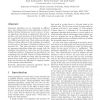Free Online Productivity Tools
i2Speak
i2Symbol
i2OCR
iTex2Img
iWeb2Print
iWeb2Shot
i2Type
iPdf2Split
iPdf2Merge
i2Bopomofo
i2Arabic
i2Style
i2Image
i2PDF
iLatex2Rtf
Sci2ools
IJNSEC
2008
2008
Fault Tolerant Weighted Voting Algorithms
Agreement algorithms can be categorized in different ways. One categorization of such algorithms is based on whether the final decisions are exact or inexact. In inexact algorithms, also known as approximate agreement algorithms, each node produces its final decision that may not be necessarily the exact same decision value produced by a different non-faulty node. Most studies on such algorithms are either oblivious to the confidence level placed on each node or the impact of malicious behavior is not accounted for. This study introduces a family of inexact agreement algorithms taking into account both the confidence level placed on each node and the presence of malicious behavior. Expressions are developed for the convergence rate and fault tolerance of these algorithms, and the effect of weights are shown when the agreement process favors nodes with a specific level of trust. The study also describes the difficulties for applying weights to the existing voting algorithms.
Related Content
| Added | 12 Dec 2010 |
| Updated | 12 Dec 2010 |
| Type | Journal |
| Year | 2008 |
| Where | IJNSEC |
| Authors | Azad H. Azadmanesh, Alireza Farahani, Lotfi Najjar |
Comments (0)

